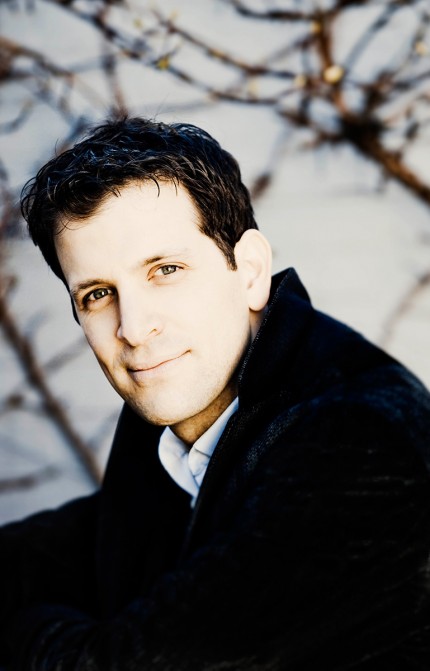Pisaroni opens vocal festival in style with Italian song
The Collaborative Arts Institute of Chicago’s fifth annual Collaborative Works Festival began Wednesday night with a solo recital by Italian bass-baritone Luca Pisaroni, accompanied by pianist Craig Terry at Ganz Hall at Roosevelt University. Although the series as a whole is titled “American Spirit” and the remaining three concerts—running through Saturday—will focus on American repertoire, the emphasis of Pisaroni’s concert was on Italian music.
Even the first half of the concert, which was entirely devoted to the music of Schubert, opened with a bit of Italian flavor with Schubert’s Drei Gesänge fur Luigi Lablanche. In these three settings of Italian texts—two by the librettist Pietro Metastasio–Schubert pulls off an entirely convincing impression of early 19th-century Italian opera, almost to the point of effacing his own identity.
While Pisaroni’s patter was faultless in the third song “Il traditor deluso,” he sounded not quite warmed up or perhaps not adjusted to the acoustic of the hall. His voice did not project well against the piano, even though Terry’s accompaniments were supportive and unobtrusive.
Any such problems were fixed for the remaining Schubert selections: songs 8-13 from Schwanengesang and three settings of Goethe poems, including the celebrated “Erlkönig”. Pisaroni performed all of these with a secure, resonant tone, which he maintained throughout the rest of the program.
Pisaroni’s bass is dark and smooth at full volume, without a hint of strain. His pianissimos were rare, but arresting. His rendition of “Der Atlas” hinged around a particularly poignant shading of the word “elend” (“miserable”). But in general, his interpretations were less about emphasizing individual words and more about maintaining a mood and building a long arc over the course of the song. A case in point was his “Der Doppelgänger,” which maintained an even, chilly hush throughout its opening before building to its wrenching final encounter between the narrator and his double.
When quick changes of character were required, as in “Erlkönig,” he distinguished them well. He expressed the child’s fear not through the customary terrified yelling but rather as if paralyzed and transfixed by the horror of the demon.
The second half of the program was devoted to Italian composers, leading off with Vincenzo Bellini. Though best known for his operas, Bellini also wrote fifteen Romanze da camera (chamber songs), of which Pisaroni sang four.
Unlike Bellini’s opera arias, which are known for their dazzling brilliance, these songs have simple, unadorned melodies. That simplicity can make them dangerous, with no poetic turns to toy with, or ornaments to hide behind. But this posed no problem for Pisaroni. His cantabile sound matched the clarity and naturalness of the melodies.
The last two Italian composers on the program were Stefano Donaudy and Francesco Paolo Tosti, turn-of-the-century writers of popular songs, which remained staples for their tuneful, unabashedly sentimental style, which flatter the voice and leave room for expression.
Pisaroni overcame the similarity of the two composers’ styles by treating them very differently. He sang Donaudy like he sang the Bellini, with unfussy directness. But in the Tosti, he employed generous rubato, caressing phrase after phrase in what was the most purely beautiful singing of the evening.
Aside from a rather unatmospheric “Die Stadt,” Craig Terry’s accompaniments paired well with Pisaroni’s singing. His performances were especially sensitive in the Donaudy and Tosti, where the piano often doubles the singer’s melodies. In those moments, he always found a way to match Pisaroni’s phrasing without threatening to overshadow him.
As his encores, Pisaroni gave a performance of Cole Porter’s “Night and Day” that maintained its ardency even as Pisaroni forgot some of the lyrics. Then he sang a tender rendition of the Gershwins’ “Embraceable You,” which he dedicated to his wife for their eighth wedding anniversary.
The Collaborative Works Festival continues 7:30 p.m. Thursday at the Poetry Foundation with American art songs performed by sopranos Laquita Mitchell and Nicole Heaston and tenor Nicholas Phan. caichicago.org/2015-collaborative-works-festival.html
Posted in Performances





